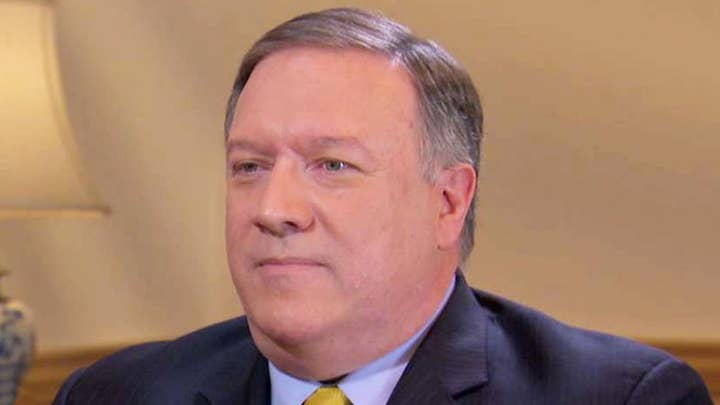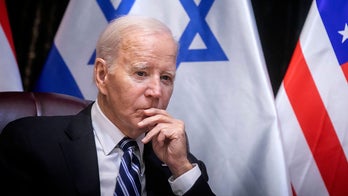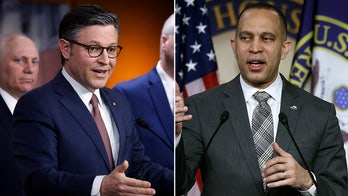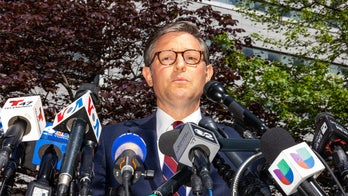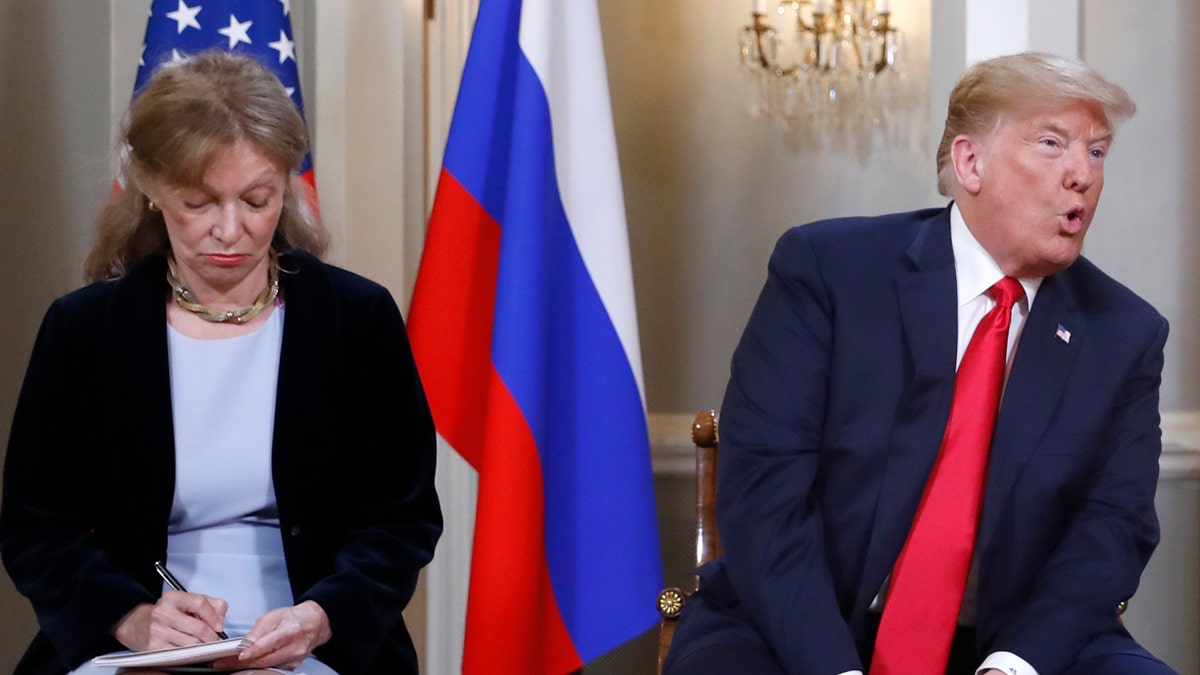
July 16: Interpreter Marina Gross takes notes while President Trump talks to Russian President Vladimir Putin. (AP)
“No one else was in…
The room where it happened.
The room where it happened.
The room where it happened.
No one really knows how the game is played.
The art of the trade.
How the sausage gets made…”
-- 'The Room Where It Happens' from the Broadway musical 'Hamilton'
A global audience will tune into room 419 of the Dirksen Senate Office Building at 2:30 p.m. ET Wednesday afternoon. That’s where Secretary of State Mike Pompeo will tell senators what he knows about what went down between President Trump and Russian leader Vladimir Putin the other day.
While everyone will focus on Dirksen 419, the problem is that Pompeo wasn’t in the room at the Presidential Palace in Helsinki where Trump and Putin huddled last week. Who was? Marina Gross, a State Department interpreter and Putin’s translator.
That’s it. Not Pompeo. Not White House Chief of staff John Kelly. Not Russian Foreign Minister Sergey Lavrov. Just Marina Gross.
She was in the “room where it happened.”
“I believe the Senate Foreign Relations Committee should hold a hearing with the American translator,” proposed Sen. Jeanne Shaheen, D-N.H., at the Senate Democrats’ weekly press conference just off the Senate floor.
“Yes!” exclaimed Senate Minority Leader Chuck Schumer, D-N.Y., standing next to his colleague and channeling Marv Albert.
“It is imperative that the American people and this Congress know precisely what the president shared or promised the Kremlin on our behalf,” continued Shaheen.
Schumer demanded a host of officials on Capitol Hill to discuss the meeting. He mentioned U.S. Ambassador to Russia Jon Huntsman and Director of National Intelligence Dan Coats.
One thing we know for sure: Coats was nowhere near the room where it happened.
“Where are the notes from that meeting? The contemporaneous notes? What did the president agree to? Was Secretary Pompeo briefed afterwards? Did he write anything down?” asked Schumer.
Rep. Bill Pascrell, D-N.J., wrote to leaders on the House Oversight Committee to require testimony from Gross.
“Given the public concessions President Trump made to Russian President Vladimir Putin by siding against the U.S. intelligence community, law enforcement, and our military officials about Russia’s attack on our democracy, Congress and the American public deserve to know the details of their private conversation,” said Pascrell. “It may be unprecedented to subpoena a translator to reveal the details of a private meeting between the President and another world leader, but Trump’s actions are unprecedented in a way that harms our national security.”
Sen. Lindsey Graham, R-S.C., opposes summoning the translator.
“That will be the last time you ever have a foreign leader with the President of the United States privately,” said Graham.
However, the South Carolina Republican says it’s important to find out if the two leaders agreed to anything.
That’s why Wednesday’s hearing with Pompeo is of paramount importance. It’s clear that DNI Coats hadn’t been briefed on Helsinki, learning uncomfortably from NBC’s Andrea Mitchell that Trump planned to invite Putin to the White House. Senators from both parties will be apoplectic if Pompeo comes to Capitol Hill bereft of information.
This isn’t a problem just facing lawmakers or even Pompeo, for that matter. Music and Broadway critics regard “The Room Where It Happens” as the show stopping number in Hamilton. They cite its jazziness. Its suspense. Its Bob Fosse-ness. But the linchpin isn’t just the music and dance: it’s the tune’s message.
Being “in the room” is the quintessence of politics. Everyone pines to be “in the room.” It’s about access. Proximity. Power. Those abandoned outside know that reflects their station in life. Therefore, they will forever be suspect of what transpired inside.
In Hamilton, Aaron Burr is trying to build his political bona fides. Yet Burr’s jealous of Alexander Hamilton. Hamilton is secretary of the treasury. Thomas Jefferson is secretary of state.
That duo meets for a clandestine meal with then-Virginia Congressman James Madison, a confidante of President Washington. This is where Hamilton, Jefferson and Madison hatch the Compromise of 1790.
Hamilton wanted to create a national bank and assume state debts to bolster the federal government’s fiscal muscle. Jefferson and Madison were both Virginians. In exchange for Hamilton’s bank gambit, Jefferson and Madison secured an agreement to move the U.S. capital to the “south” – the present location of Washington, DC. Such a scheme would marshal just enough votes from southern lawmakers to agree to Hamilton’s financial system.
“Two Virginians and an immigrant walk into a room…
Diametrically opposed, foes…
They emerge with a compromise, having opened doors…
That were previously closed…” sings a dubious Burr of Jefferson and Madison huddling with Hamilton.
After all, everyone wants to be in the inner sanctum. To be relevant. To have a seat at the table.
And here is Burr, on the outside looking in as his rival Hamilton cuts one of the first, monumental political deals in American history….
Behind closed doors, of course.
“No one really knows how the…
Parties get to yes.
The pieces that are sacrificed in…
Every game of chess…”
This is why historians relish parsing hours of recorded phone calls by President Lyndon Johnson. This is why Republicans were so suspicious of Democrats, hammering out the details of Obamacare in a “smoke-filled room.” This is why Democrats were mistrustful of Republicans, crafting their tax bill behind closed doors.
The phenomenon is at least as old as the republic. It’s just that the American system offers a chance to have a seat at the table. There’s also an expectation of some transparency.
We’ll learn exactly what the President was willing to share with Pompeo at the Foreign Relations Committee hearing Wednesday afternoon. But with no one else between the four walls, conspiracy theorists and mainline political foes of the President can have a ball.
“Putin appears to be Trump’s puppeteer,” observed House Minority Leader Nancy Pelosi, D-Calif. “What is President Putin blackmailing President Trump with?”
The president has berated the press for what he characterizes as negative coverage of the session with Putin.
“I had a GREAT meeting with Putin and the Fake News used every bit of their energy to try and disparage it. So bad for our country!” thundered the President on Twitter.
But the problem is, Pompeo was left out on the street like Aaron Burr. Only Mr. Trump and Putin were in the room “where it happened.”
